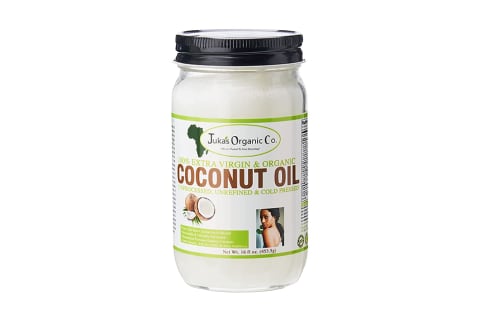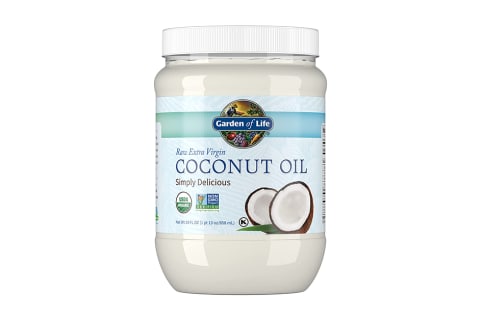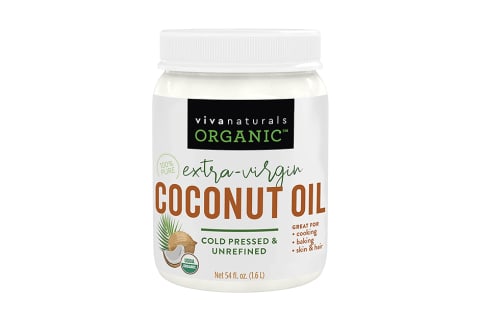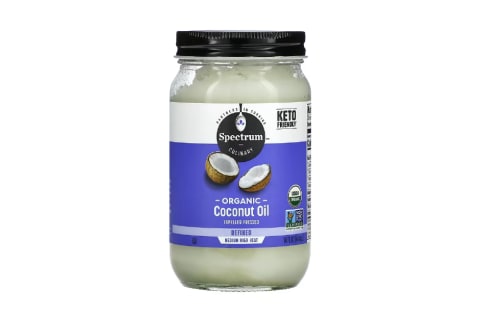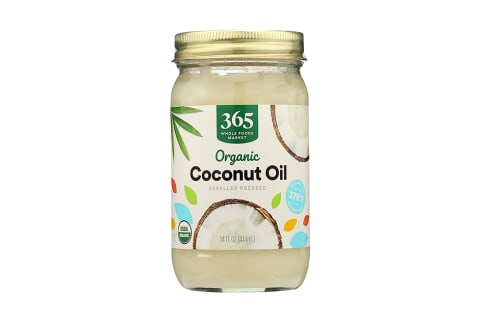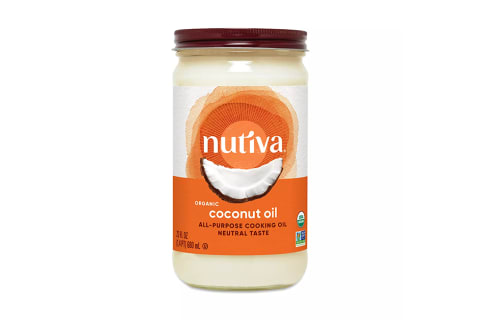“Unrefined coconut oil doesn’t go through extra processing steps like refined does. It’s extracted from coconut meat using a dry or wet method1,” says clinical and culinary dietitian Huma Chaudry, R.D. You may also see unrefined coconut oil labeled as cold-pressed. This means the coconut oil was extracted from coconut milk without any heat. To do so, the outer husk of a matured coconut, which can yield more oil2 than young coconuts, is removed and then pressed to slowly pull out the oil. Aside from having a better nutritional profile, this method helps reduce production costs and takes less energy, which makes it more environmentally friendly. The downside for producers is that cold-pressing creates lower yield than other methods of extraction. That’s why this type of oil is often more expensive than refined or expeller-pressed varieties. “Because it hasn’t gone through a lot of processing, you’re still getting a strong coconut flavor and smell, so that means when you’re cooking with it or using it in recipes, you’re going to taste it,” says integrative dietitian Jessica Cording, R.D. Lauric acid is a good, quick energy source that our body can use and is easier to digest, according to Chaudry. Lauric acid is also antimicrobial, antifungal, and anti-inflammatory3. In addition, coconut oil provides a natural source of caprylic acid4, which also provides antimicrobial properties5. There is debate on whether or not coconut oil can be good for heart health. In one study6, researchers compared the effect of butter, olive oil, and coconut oil on cholesterol levels. They found that, despite its higher saturated fat content, coconut oil didn’t raise LDL cholesterol levels. It also increased HDL, or “good cholesterol” levels, even more so than olive oil. Conclusive claims cannot be based on one study, and due to the high saturated fat content of coconut oil, it’s a good idea to limit intake to 1-2 tablespoons per day. She also suggests looking for glass containers, which can serve double duty. “Glass jars are more sustainable because they limit plastic consumption and are reusable. They make great containers for overnight oats and smoothies when you’re on the go,” she says. According to a 2021 report in Bioprocess and Biosystems Engineering2, refining removes some of the antioxidants and polyphenols that are naturally found in the oil. Refined coconut oil is also often exposed to heat somewhere along the refining process, which can further degrade its nutrients and negatively affect its antioxidant properties. During a conventional refining process, some chemicals like hexane may be used. If you go organic, you naturally reduce your exposure to chemicals like this, which can be toxic in high amounts7. Keep in mind that coconuts are technically a tree nut allergen, so if you’re cooking for someone else, make sure you get the all-clear from them. Or if you’re not a coffee drinker, you can try these other recipes here. Here’s our beginner guide to getting started on the keto diet. Ready to eat a more Mediterranean-inspired diet? Here’s a 7-day meal plan. It also has an emollient effect that may be helpful to those with skin conditions, like atopic dermatitis9. As for whether it clogs pores: That depends on the individual, according to Cording. “Our gut microbiomes dictate a lot of what happens with our skin health. One person might react one way, while another reacts completely differently,” she says. Another tip to keep in mind. “If you’re going to be wearing anything where oil stains are a possibility, wait until [the oil] seeps in” before getting dressed, says Cording. Here’s your primer on how to start incorporating coconut oil into your skin care routine. Here are six ways to use coconut oil for more luscious hair. Both unrefined and refined coconut oils have a high concentration of lauric acid, which has antibacterial properties that can be good for your teeth. Functional medicine gynecologist Wendie Trubow, M.D., recommends using unrefined coconut oil in the bedroom, previously telling mbg that “the less messed with, the better.” If it’s your first time using unrefined coconut oil as a lubricant, only use a little bit to make sure you’re not allergic. While refined coconut oil is OK in moderation, experts typically recommend sticking with unrefined versions whenever possible or using a neutral option like avocado oil when you don’t want that coconutty flavor. She has written twelve books and has had more than 2,000 articles published across various websites. Lindsay currently works full time as a freelance health writer. She truly believes that you can transform your life through food, proper mindset and shared experiences. That’s why it’s her goal to educate others, while also being open and vulnerable to create real connections with her clients and readers.




